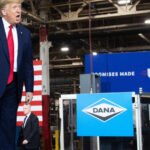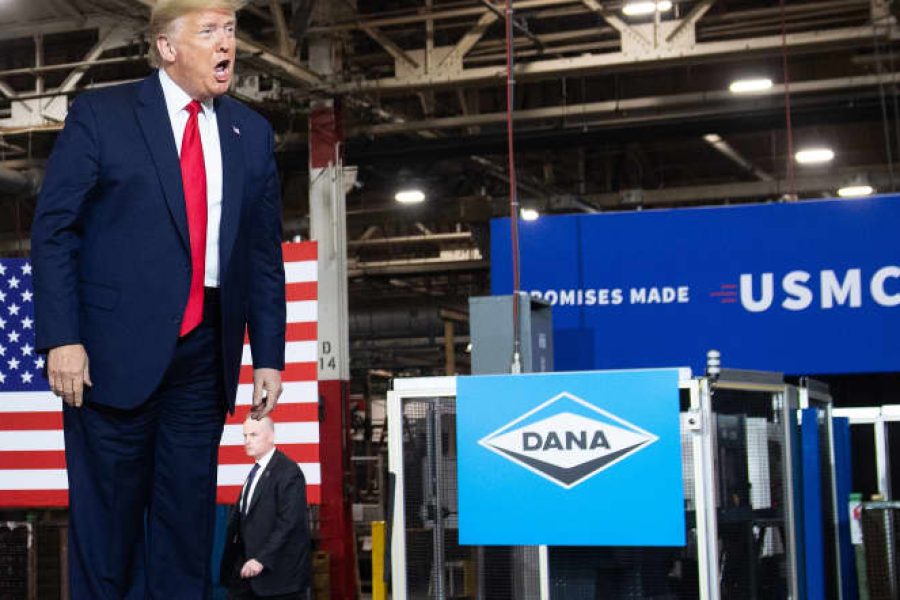Key takeaways:
- Trump’s proposed tariffs are expected to hit automotive suppliers harder than automakers.
- Most vehicles in North America comply with USMCA, but fewer individual parts meet these standards.
- Disruptions in the auto supply chain could significantly affect production costs and timelines.
Introduction
The automotive industry is bracing for significant challenges due to newly proposed tariffs under the Trump administration, with various implications for automotive suppliers and manufacturers alike. Key points include:
- Automotive suppliers are likely to face steeper repercussions from tariffs compared to automakers.
- Compliance with the United States-Mexico-Canada Agreement (USMCA) varies with many individual parts falling short.
- The ripple effect of the tariffs could disrupt production across the broader industry, impacting investors’ decisions.
Detailed Analysis
The automotive sector, a crucial pillar of the North American economy, is encountering a storm of uncertainty with the proposed tariffs on imports from Canada and Mexico. While automakers have been vocal about the potential impact of these tariffs, industry experts indicate that the real pressure point will likely be felt more intensely among auto suppliers.
According to reports, the majority of vehicles manufactured in North America satisfy USMCA regulations; however, considerably fewer individual supplier components comply with these standards 1. This discrepancy highlights potential vulnerabilities as suppliers may struggle to adapt to heightened costs associated with tariffs—an estimated additional burden that could deter international trade in automotive components.
Many in the industry are pointing to a ‘tariff winter’ scenario where prolonged imports and global supply chain adjustments could lead to a long-term shift in production strategies. A study indicates that if tariffs solidify, North American light-vehicle sales may subsequently drop by 10% over the next few years 2. This decline could be coupled with rising consumer prices, as anticipated tariff impacts could work their way down from manufacturers to consumers. Patrick Anderson of East Lansing’s Anderson Economic Group mentions projections of an increase of $9,000 on full-size SUVs as a direct consequence of tariff impositions 3.
As automakers like General Motors, Ford, and Stellantis consider relocating some production to avoid tariffs, the reality of such logistical shifts raises eyebrows. The substantial costs of abandoning well-established supplier networks pose a significant challenge for manufacturers 4. Furthermore, the reality that auto companies have multiyear commitments complicates swift pivots in production plans. As Ford’s Executive Chairman Bill Ford remarked, “Our lead times are longer than political lead times,” highlighting the tension between necessary adjustments and existing production commitments 5.
Experts assert that the resulting disruption would not be limited to automakers alone. Suppliers are already experiencing rising labor costs and resource complications that could now be exacerbated by tariffs. This change in market dynamics may further erode suppliers’ profit margins unless a quick resolution to tariffs is negotiated.
Conclusion
In summary, the proposed tariffs by the Trump administration present an intricate challenge for the automotive ecosystem, particularly affecting suppliers who form the backbone of production. Retail investors should closely monitor these developments, as further disruptions could lead to increased overhead costs, delayed production timelines, and ultimately affect sales within this vital sector. Investors may want to take note of shifts in the automotive stock due to fluctuating trade policies, as the industry’s volatility may present both challenges and opportunities moving forward.
References
1 Tariffs’ Winners And Losers In The Auto Industry. Forbes. Retrieved October 2023.
2 Tariffs on Auto Industry: Extended Disruption Now More Likely. S&P Global. Retrieved October 2023.
3 Auto industry’s long product cycles clash hard with Trump’s tariff timelines. USA Today. Retrieved October 2023.
4 Trump Forces Carmakers to Game Out Calculus on American Plants. Yahoo Finance. Retrieved October 2023.
5 Global car industry faces anxious wait on US tariffs. Financial Times. Retrieved October 2023.
Tags: automotive, tariffs, USMCA, investment, suppliers

